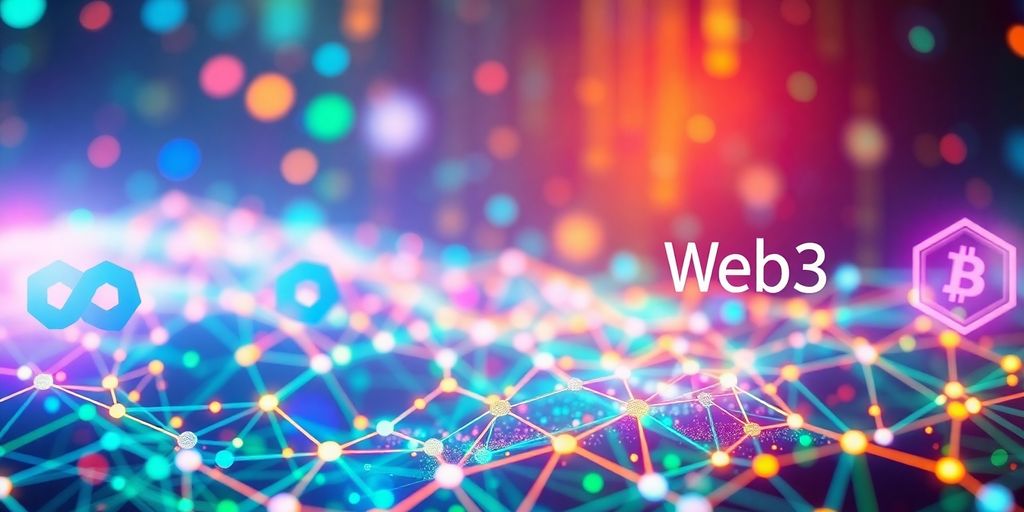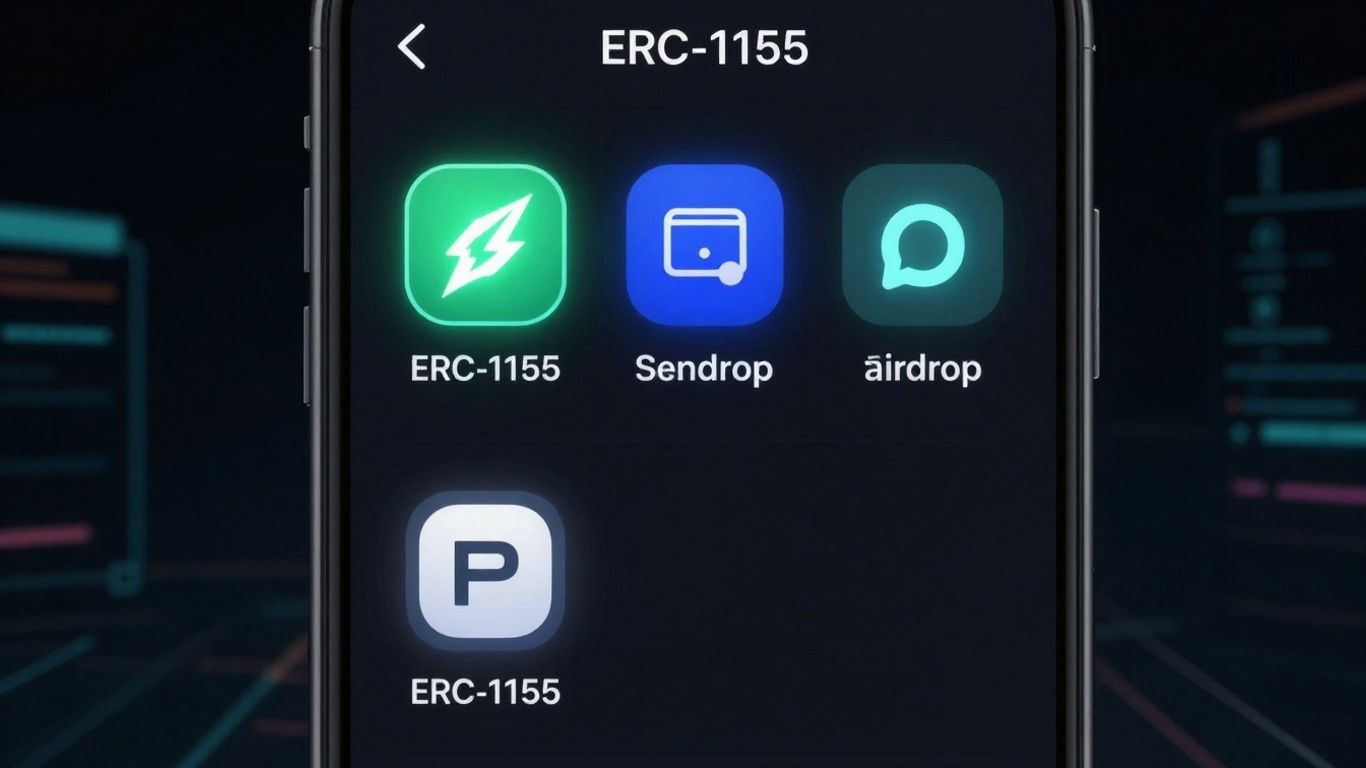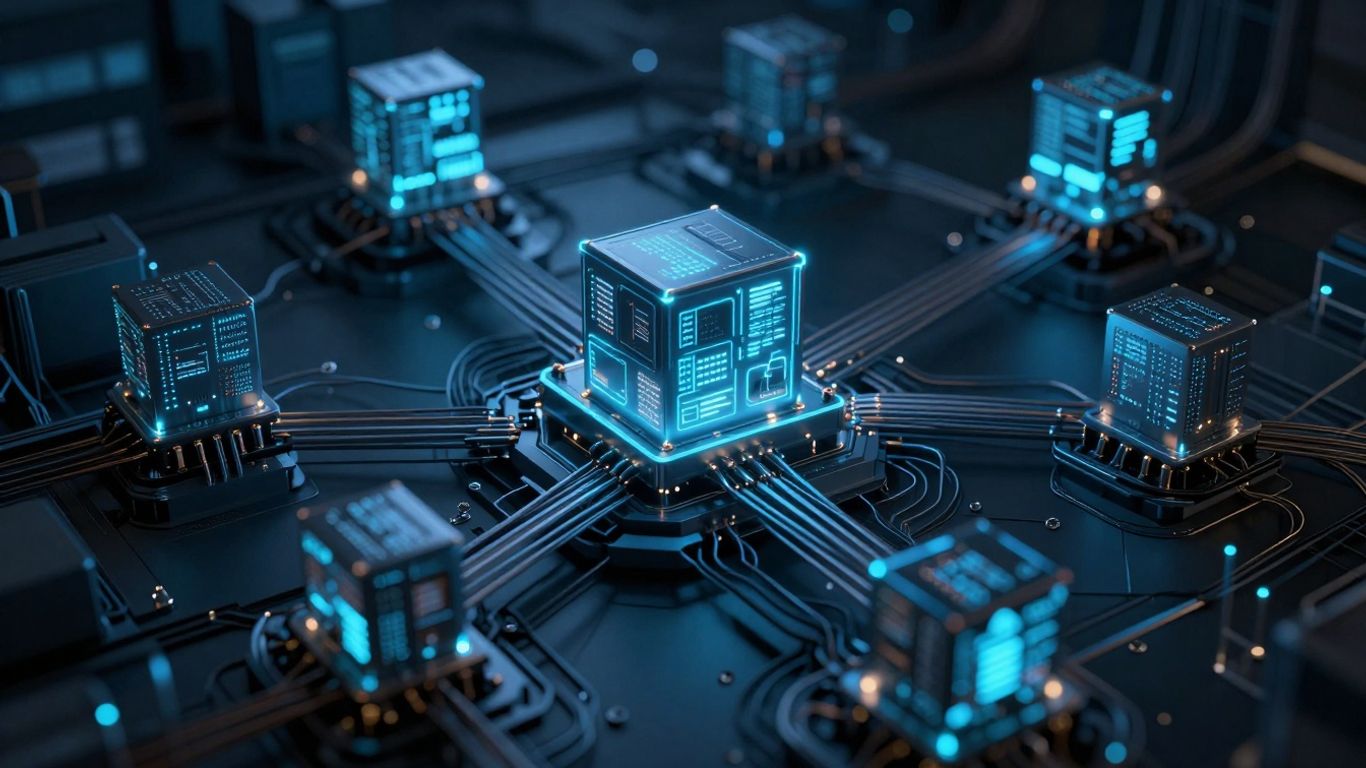[ newsletter ]
Stay ahead of Web3 threats—subscribe to our newsletter for the latest in blockchain security insights and updates.
Thank you! Your submission has been received!
Oops! Something went wrong. Please try again.
Discover how AI in Web3 is revolutionizing innovation, enhancing security, and empowering users in the digital landscape.





The fusion of AI and Web3 is reshaping the digital landscape, offering a glimpse into a future where technology is more decentralized and user-focused. With AI's ability to process vast amounts of data and Web3's emphasis on decentralization, we are on the brink of innovative developments that could change how we interact with the internet. This article explores the significant impact of AI in Web3, highlighting its potential to drive future innovations.

Okay, so AI and Web3 are like, the new power couple in tech. You've got AI, which is all about making machines think, and then Web3, which is trying to build a new, decentralized internet. When you put them together, things get interesting. It's about making the internet smarter and giving more control to the users.
Decentralization is a big deal in Web3. Instead of everything being controlled by a few big companies, the idea is to spread things out. Think of it like this: instead of one giant bank controlling all the money, you have a bunch of smaller, independent banks. This makes it harder for any one entity to control everything, which is supposed to make the internet more open and fair. It's a shift away from the traditional, centralized model we're used to. This is where decentralization really shines.
Blockchain is the tech that makes decentralization possible. It's like a digital ledger that everyone can see, but no one can change without everyone else agreeing. This makes it super secure and transparent. In Web3, blockchain is used for everything from tracking ownership of digital assets to running decentralized applications. It's the backbone of the whole system, ensuring that things are fair and trustworthy. It's a pretty big deal, and it's changing how we think about the internet. Ant Digital Technologies is working hard to make blockchain more accessible.
One of the main goals of Web3 is to give users more control over their data. In the current internet, companies collect tons of data about us, and we don't really have much say in it. Web3 wants to change that by giving users the ability to own and control their own data. This means you get to decide who gets to see your information and what they can do with it. It's all about putting the power back in the hands of the users, which is a pretty cool idea. It's a big shift from how things are now, and it could have a huge impact on privacy and security.
Web3 is trying to create a more democratic and user-centric internet. It's not just about technology; it's about changing the power dynamics of the internet and giving people more control over their digital lives.
AI can really make dApps better. Think about it: AI can automate tasks, make predictions, and personalize user experiences in ways that weren't possible before. This means dApps can become more user-friendly and efficient. For example, an AI-powered dApp could analyze user behavior to suggest relevant content or automate complex transactions. It's all about making these applications smarter and more intuitive.
Data security is a big deal, especially in Web3. AI can play a role in making things more secure. AI algorithms can detect and respond to threats in real-time, which is a huge advantage. Plus, AI can help with things like identity verification and access control, making sure only authorized users can access sensitive data. It's like having a super-smart security guard that never sleeps.
One of the coolest things about AI in Web3 is its ability to help with autonomous decision-making. Imagine decentralized organizations that can make decisions without human intervention. AI can analyze data, identify trends, and make recommendations, allowing these organizations to operate more efficiently. This could lead to new forms of governance and collaboration that are truly decentralized.
AI can help Web3 reach its full potential. By automating tasks, improving security, and enabling autonomous decision-making, AI is paving the way for a more decentralized, efficient, and user-friendly internet.
AI's ability to process huge amounts of data is a game changer when combined with Web3. This integration allows for smarter decentralized applications and more efficient data analysis within the Web3 environment. Think of it as giving Web3 a brain boost, allowing it to do things it couldn't do before. It's not just about adding AI; it's about making the whole system more intelligent and responsive.
Web3 is all about decentralization, and that doesn't change when AI gets involved. The goal is to make sure AI algorithms and data are transparent and not controlled by a single entity. This means:
The combination of decentralization and transparency is what makes this ecosystem trustworthy. It prevents the concentration of power and ensures that everyone has a fair shot.
One of the biggest promises of Web3 is giving users control over their data. When AI comes into the picture, it's important to keep that promise. Users should be able to decide how their data is used and have a say in the AI algorithms that affect them. This involves:
This focus on data governance ensures that the AI and Web3 ecosystem remains user-centric and respects individual rights. It's about building a system where technology serves people, not the other way around.

Okay, so smart contracts are cool, right? But what if we added some AI magic? Think about it: smart contracts that can actually learn and adapt. That's the promise of AI-powered smart contracts. Instead of just blindly following code, they could analyze data, predict outcomes, and adjust their behavior accordingly. It's like giving them a brain!
DeFi is already changing the game, but AI could take it to a whole new level. Imagine AI algorithms that can optimize your investments, predict market trends, and manage your portfolio automatically. No more staring at charts all day! Plus, AI could help make DeFi more accessible to everyone, not just the crypto experts. We could see smarter decentralized applications that are easier to use and more effective.
AI can bring a level of sophistication and automation to DeFi that was previously impossible. This could lead to more efficient markets, better risk management, and increased participation.
Data is the new oil, and AI is the engine that refines it. In a Web3 world, AI could power decentralized data marketplaces where individuals and organizations can buy, sell, and trade data in a secure and transparent way. This could unlock new opportunities for data monetization and collaboration, while also giving users more control over their own data. Think about blockchain technology enabling a whole new economy around data.
It's pretty wild to see how many new companies are popping up that are trying to blend AI and Web3. You've got this whole new wave of innovation happening, and it's driven by startups that are willing to take risks and try new things. It's not just about cool tech; it's about building a different kind of internet, one that's more open and fair. Let's take a look at some of the companies that are leading the way.
There are a few companies that really stand out when you look at who's pushing the boundaries. These aren't necessarily household names yet, but they're doing some seriously interesting work. These companies are not just building tools; they're building the infrastructure for a whole new digital world.
Investors are starting to pay attention, and you can see that in where the money is flowing. It's not just about throwing cash at any project with "AI" and "Web3" in its name; there's a growing understanding of what makes a project viable. The Forbes Artificial Intelligence 50 list is a good place to start if you want to see who's getting recognized.
Here's a quick look at some recent investment trends:
| Trend | Description
Okay, so, AI and Web3 together? Sounds cool, right? But let's be real, it's not all sunshine and rainbows. One of the biggest headaches is privacy. I mean, Web3 is supposed to be all about owning your data, but AI needs data to, well, do anything. It's a tricky balance. How do you feed the AI beast without turning into a privacy nightmare? It's like trying to build a sandcastle that can withstand a hurricane – tough. We need better ways to protect user info while still letting AI do its thing. Think encryption, differential privacy, and maybe even some new tech we haven't thought of yet. It's a puzzle, for sure.
AI ethics is a hot topic, and it gets even hotter when you throw Web3 into the mix. Who decides what's fair when AI is making decisions on a decentralized platform? It's not like there's a central authority to keep things in check. Bias in AI algorithms is a real problem, and if those biases get baked into Web3 apps, it could be a disaster. Imagine a decentralized lending platform that unfairly denies loans based on biased AI. Not cool. We need to figure out how to build AI that's fair, transparent, and accountable, even in a decentralized world. It's a big responsibility.
Regulations are always playing catch-up with new tech, and AI in Web3 is no exception. It's a legal gray area right now, and that makes things complicated. Different countries have different rules, and it's hard to know what's allowed and what's not.
It's like trying to drive a car without knowing the traffic laws. You might get away with it for a while, but eventually, you're going to crash. We need clear regulations that protect users without stifling innovation. It's a tough balance, but it's essential for the long-term success of AI in Web3.
Here are some things regulators might focus on:
And here's a table showing the current regulatory status in different regions:
AI and Web3 together? It's not just tech hype; it's a breeding ground for totally new ways to do business. Think about it: AI can automate processes, personalize user experiences, and make predictions with crazy accuracy. Now, throw in Web3's decentralization and you've got a recipe for business models that are transparent, secure, and user-centric. We're talking about stuff that wasn't even possible a few years ago. For example, AI-driven data marketplaces could let people directly monetize their information, cutting out the middleman.
Digital economies are about to get a serious upgrade. AI can optimize resource allocation, predict market trends, and even create entirely new digital assets. Web3 provides the infrastructure for these assets to be traded and managed securely. Imagine AI algorithms that automatically adjust interest rates in decentralized finance (DeFi) protocols based on real-time market conditions. Or AI-powered DAOs (Decentralized Autonomous Organizations) that make decisions based on data analysis, not just gut feelings. It's a whole new level of efficiency and responsiveness.
User experience is everything, right? AI in Web3 can make things way better. AI can personalize content, automate tasks, and provide intelligent assistance. Web3 ensures that users have control over their data and privacy. This combination can lead to experiences that are not only more engaging but also more secure and respectful of user autonomy. Think about AI assistants that can manage your digital identity across different Web3 platforms, or personalized recommendations for decentralized applications based on your preferences and data. It's all about making the digital world more intuitive and user-friendly.
The convergence of AI and Web3 isn't just about technology; it's about creating a more equitable and user-centric digital future. It's about giving people more control over their data, their identities, and their digital experiences. It's a future where technology serves humanity, not the other way around.
In wrapping things up, it's clear that the mix of AI and Web3 is shaping up to be a game changer. As we move forward, these technologies are set to redefine how we interact with the digital world. With AI's ability to learn and adapt, paired with Web3's focus on decentralization and user control, we can expect a future where our online experiences are not only smarter but also more secure and private. This partnership opens doors to new applications and services that could transform industries and empower users like never before. So, as we stand on the edge of this new digital frontier, it’s exciting to think about what’s next. The potential is huge, and we’re just getting started.
AI and Web3 work together to create smarter online applications. While AI helps machines learn and make decisions, Web3 offers a decentralized way to manage data and user identities.
Web3 gives users more control over their personal data and digital identities. This means individuals can decide how their information is used and shared.
Decentralized applications, or dApps, are programs that run on a blockchain. They are not controlled by a single entity, making them more secure and transparent.
AI can enhance Web3 by improving security, automating decisions, and making applications more efficient. This combination can lead to better user experiences.
Some challenges include keeping user data private, ensuring AI is used ethically, and dealing with regulations that may not yet cover these new technologies.
We can expect new business models, improved digital economies, and experiences that are more personalized and secure for users.


